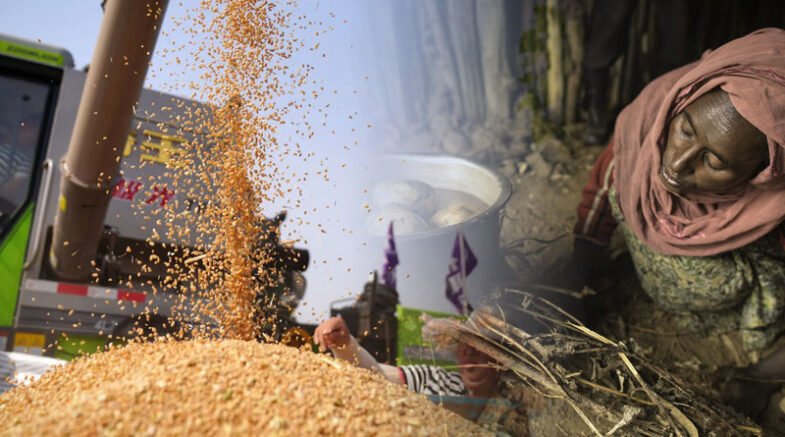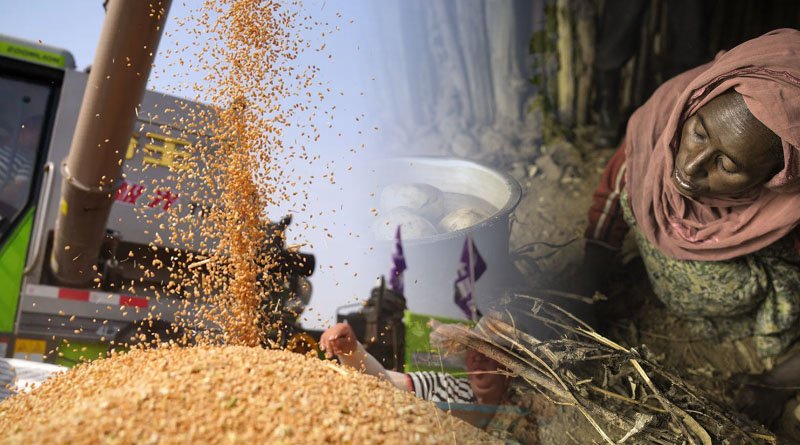The conference’s conclusions included suggestions for improving the nation’s food systems through saline agriculture.

Concern over the food shortage in World was raised by national and international speakers on the third and final day of the conference on the management of saline resources in the context of global climate change.
The conference’s speakers all agreed that funding should be prioritized for research on climate change and other issues, such as food shortages, and that the government should invest in science and technology.
According to a statement, the Salim Habib University, the Nuclear Institute of Agriculture, and the University of Karachi’s Dr. Mohammad Ajmal Khan Institute of Sustainable Halophyte Utilization collaborated to jointly organise the international event.
The conference’s conclusions included suggestions for improving the nation’s food systems through saline agriculture. Dr. Irfan Aziz, an associate professor at KU MAK-ISHU, presented the suggestions after consulting with the attendees.
Although there is labour in Pakistan, according to Dr. Salman Gulzar, director of KU MAJ-ISHU, “we always look towards the west for the solution to our problems.” He told the audience that “our research institute would facilitate them in making saline lands suitable for cultivation” if the provincial and federal governments supported the KU MAJ-ISHU.
“We will require resources and money to easily turn the salty and desolate lands into green fields.” The conference’s principal organiser, Dr. Salman Gulzar, made a suggestion that the government sector invest more in science and technology by increasing research funding, particularly in sustainable development, non-traditional crop production, and carbon sequestration in light of global warming.
The attendees emphasised the significance of continuing to hold such conferences and expanding regional and international research collaborations during the closing ceremony.
The world’s rapidly growing population, the depletion of resources, and climate change, according to experts from various nations, including the United States, Russia, China, Bangladesh, Malaysia, Pakistan, Britain, Iran, and others, are some of the main causes of food shortage world-wide.
Due to increasing soil erosion, climate change, and pressure from the growing human population, they noted that the current agricultural production would need to be doubled, which seemed to be a challenge to mitigate food shortage in world. In this case, these issues could be resolved by growing non-traditional halophyte crops on rich soils.
They warned that due to the current state of the economy and the effects of climate change, there would be severe food shortages in the upcoming decades, for which alternative products and inexpensive livestock feed had become essential.
Regarding the importance of utilisation, it was stated that a prime example was the institution’s cultivation of halophyte fodder using saline water in the Thar Desert. While scientists from the United States, China, the United Kingdom, and Portugal gave their online lectures, delegates from Pakistan, Russia, China, and Iran attended the conference.
A total of 80 people took part in the event, including national delegates, professors, and research students from the Federal Urdu University of Science, Arts, and Technology and the Department of Botany, Microbiology, and Institute of Environmental Studies at the University of Karachi.
Twenty students from the University of Karachi and Salim Habib University presented their posters during two sessions, during which 12 participants gave oral presentations, four gave online lectures, and four delivered online tutorials. Sessions happened concurrently.
Dr. Brent Nielsen from Brigham Young University in the USA presented his research on the role of halophilic bacteria in enhancing the growth and yield of “alfalfa,” also known as lucerne, under extremely salinous conditions.
The bioengineering of the salicornia rhizosphere with marine plant growth-promoting bacteria increased plant tolerance to abiotic stresses, according to Dr. Bernardo Duarte of the University of Lisbon in Portugal.
Salim Habib University’s Dean of Biosciences, Professor Dr. Aqeel Ahmad, expressed concern that the loss of microbial flora was making plants more vulnerable to diseases and other stresses. Therefore, increasing microbial diversity is necessary for endophytic organisms to increase plant production.
Dr. Masoumeh Salehi of the National Salinity Research Center in Yazd, Iran, spoke about the successful domestication of unusual food crops among halophytes in Iran under semi-arid saline conditions, including quinoa, bassia, and panicum.
Additionally, Drs. Qurban Ali Panhwar and Asma from the NIA Tandojam presented their research on the use of bacteria that promote plant growth in boosting the yield of food crops grown in Sindh, such as rice and chilli varieties.
Dr. Afshan Rehman from the KU Department of Botany presented her research on the treatment of salt stress on tomato crops and the enzymatic profiling of halo-tolerant endophytic bacteria.Professor Dr. Jean W.H. Yong of Sweden brought up the importance of bio-stimulants in promoting tomato varieties’ salinity resistance during a separate parallel session on climate-smart agriculture.
The application of halophytic nanoparticles in enhancing tomato seedling growth performance and salinity resistance was discussed by Dr. Neelam Munir of Lahore College Women University.
